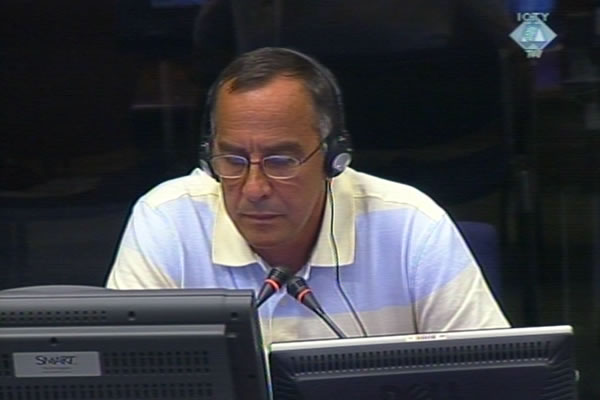Home
INVESTIGATIONS OF CRIMES LEFT FOR ‘BETTER TIMES’
Radovan Karadzic was cautioned once again against wasting time on ‘trivial issues’. Isak Gashi, who used to be a Yugoslav, explained why he became a ‘Muslim, a Bosniak, an extremist’. Former president of the Brcko War Presidency explained what measures were taken to investigate crimes in the Luka Prison
 Isak Gasi, witness at the Radovan Karadzic trial
Isak Gasi, witness at the Radovan Karadzic trial ‘Mr. Karadzic, I am not of Muslim origin. My father is a Kosovo Albanian and my mother is a Muslim from Brcko. I was raised to be a Yugoslav. You Serbs made me become a Muslim, a Bosniak, and an extremist in 1992’.
This is how Isak Gashi, former prisoner in the Luka prison camp in Brcko, replied to Radovan Karadzic after the accused complained to the Trial Chamber that he didn’t have enough time for the cross-examination. By that time Karadzic had spent almost two hours trying to ‘paint a picture of Brcko through a witness of Muslim origin’.
Karadzic began his cross-examination by highlighting the suffering of Serbs in World War II. Karadzic then asked the witness about the effort to arm Muslims and establish paramilitary formations. He put questions about the first conflicts in Brcko and Bijeljina, the arms shipments from Croatia and the destruction of bridges over the Sava river. In a bid to discredit the witness, the accused quoted from the statements and transcripts of the evidence Gashi has given since 1992. For the most part, when the accused asked him such questions, Gashi said, ‘I don’t know anything about that’.
As Gashi’s evidence drew to a close, Karadzic asked him several questions about the Luka prison camp. The accused also put it to Gashi that he was ‘arrested by mistake’. ‘The police didn’t make a mistake when they went looking Isak Gashi, an athlete’ Gashi said, adding, ‘in Luka I was arrested and beaten up, I saw everything that happened there. All of a sudden I had an urge to pray to God although I was not a believer, asking myself why I ended up in the prison camp’.
After Gashi completed his evidence, the prosecutor called Djordje Ristanic, former president of the war presidency in Brcko municipality. At the beginning of his evidence Ristanic was warned that he didn’t have to reply to any questions that might incriminate him.
In the examination-in chief, Ristanic said that only 20 percent Serbs lived in Brcko, but they took over the town in order to ‘secure the route to Bijeljina’. Ristanic also said that ‘the Serbs had minimal forces’ and that the paramilitaries arrived on 4 May 1992. The witness went on to claim that he didn’t know why ‘the Serb forces and soldiers’ detained civilians in the Luka prison camp. The witness agreed with the prosecutor that there was ‘no legal ground to do that’. In Ristanic’s words, ‘there has to be a procedure for that and people should be charged with something’ before an arrest can be made.
As Ristanic said, the war presidency had no power to order the Luka prison camp to close down. What they could do, the witness claimed, was to ‘ask’ Goran Jelisic to release 80 to 100 persons and Jelisic complied. According to Ristanic, he visited the prison camp only once because ‘nothing could be done to help’. ‘I was the only one in Brcko who didn’t want to go to Luka if I didn’t have to,’ he added. When the prison camp closed down, the war presidency identified the victims and their number, Ristanic said, and the investigation and prosecution of crimes was left for ‘better times’.
Djordje Ristanic continues his evidence on Monday.
